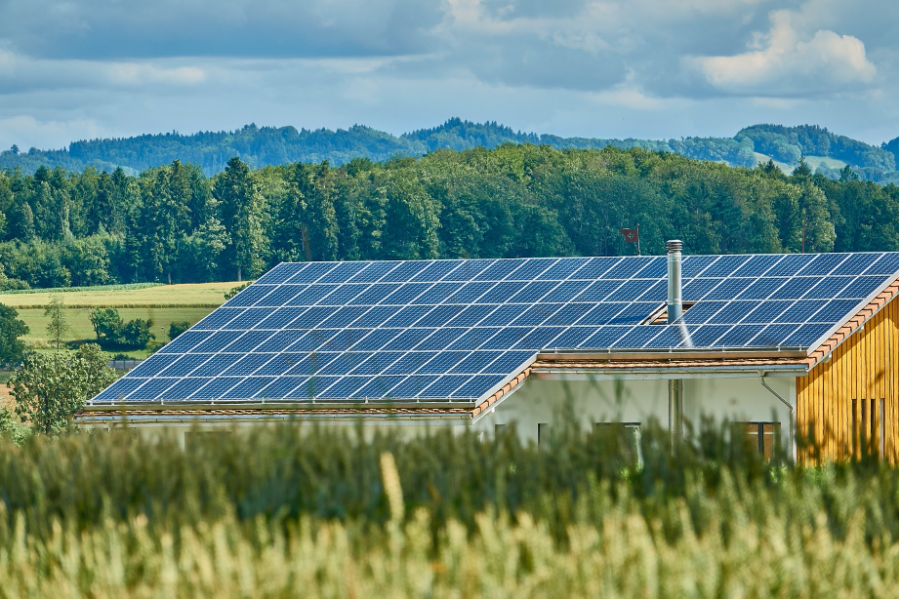Solar Panels: DC v/s AC, which one is best?
The word solar panel is used to describe a photo-voltaic unit colloquially. A PV unit is an assemblage of photo-voltaic cells attached in a structure for installation.
Over the years, solar panels have developed into one of the most used sources of renewable energy.
Most people attach solar panels to the utility grid, ensuring a 24/7 power supply during the day and the night.
- During the day:- Solar panels generate electricity via sunlight
- During nights: – The electricity can be bought through the utility grid.
The lack of electric production during the dark asked for a remedy. It was presented in the form of solar batteries, which is a more convenient and budget-friendly option.
Solar batteries have made it possible to stock electricity produced during the day as a backup when it gets dark.
Solar batteries have proved to be an efficient and practical option. However, if you are planning on getting the batteries installed, it’s a necessity that you are aware of the two main types available in the market.
These include:-
- AC-coupled Batteries for Solar: – AC batteries store both the grid power and solar panel energy as alternation current (AC). AC is the type of electricity that is used in homes most commonly for electric appliances.
- DC-coupled batteries for Solar: – DC batteriesstore direct current (DC) that flow from the solar panels, and the Alternating current from the grid is stored after being converted to DC.
A major distinction between alternating current (AC) and direct current (DC) lies in the distance that can be traveled between the two types of currents. Usually, when the current is transported, it suffers losses along the way.
AC is typically capable of traveling a lot further compared to DC electricity. AC is a lot more controlled category of current with a set rate, thus providing engineers the benefit of predicting it efficiently when traveling it to longer distances.
The distinction between AC and DC coupled batteries?
As already mentioned, a battery can either be AC coupled or DC coupled. The major distinction among the two types is the inverter type used in their making.
AC coupled batteries
An AC coupled structure will typically use as a minimum of two inverters.
- The First inverter: – It would be a standard solar inverter that can convert the power to AC from DC.
- The Second inverter: – The second inverter is a DC portable power inverter. It is tasked to switch the load back to direct current to charge the batteries.
An Ac battery is more comfortable to design and install.
DC-coupled battery
A DC-coupled battery system requires only one inverter. It is because the inverter can be used for the battery and the solar array that it is paired with it.
Since this inverter category tends to be a lot more specialized, it’s a comparatively expensive option.
Although the mechanism and the assembly of both batteries types have been mentioned, it’s the owner’s choice to select.
Choosing between Ac-coupled and Dc-coupled batteries
Various people around the globe are efficiently using both types of batteries. The critical point here isn’t to show that one type is better than the other.
However, certain factors govern this area. The aspects could see the potential buyer leaning towards one type rather than the other.
Ac-Coupled System
There are two main reasons why you might want to opt for the Ac-coupled system. Firstly, these systems tend to be cheaper.
As already mentioned above, their mechanism varies, and so does the inverters used in them.
An Ac battery has a more simplified structure; thus, two inverters are installed with a simple operation. Hence, these inverters tend to be a lot easier to design and install.
Practicality is another benefit of having these batteries installed since they are also a lot easier to operate.
Another reason that people often use this mechanism is that it’s a budget-friendly option and comparatively cheaper.
If you already have a solar array installed, an AC-coupled battery can store electricity for dark in a more affordable yet efficient manner.
DC-coupled system
A DC power system will be a better choice if you install it with a solar array at once.
It is because the DC portable power systems tend to be more efficient and undergo fewer power losses provided that the electricity merely travels through a single inverter rather than two.
If you are concerned about maximizing the battery output, then a DC power system is the best option you can use. In certain situations, a DC load like a DC air conditioner can be used to minimize losses to a greater extent.
Although there is no particular best in the category, it’s essential to choose the right options that you can benefit from.
The choice would vary for different people depending on price range and usage type, so it’s necessary to conduct thorough research on the topic.
AC to DC converter
However, if you have an electrical appliance that you need to operate, lack a place to plug it in. When you have to run a usual domestic electrical type appliance in a particular area where there is a lack of regular grid power availability, it could be a problem to calculate the battery size you would need.
The online AC to DC converter calculator will help you find out the battery size and the power inverter you would need for your purposes.
The benefit of using this tool is that it’s easily accessible without any costs. You don’t have to pay for anything or download software to benefit from it.
The user has to choose the current target type in which you need to convert. The next step would be to add the values of the current.
Another benefit that can be obtained from the calculator is that you can build your knowledge of conversion. The calculator contains the entire process, including the formula used in the conversion.
Share It on :





